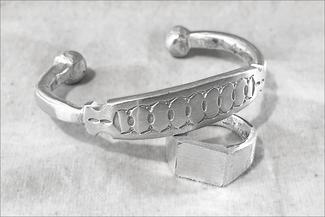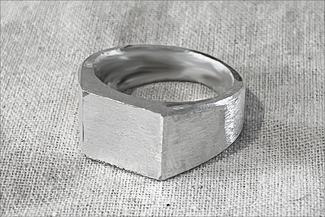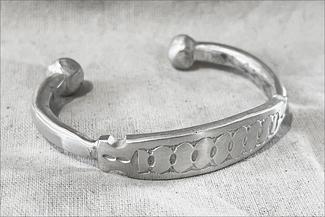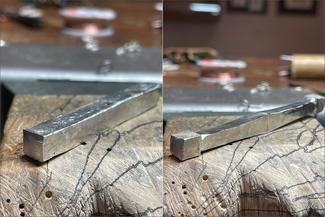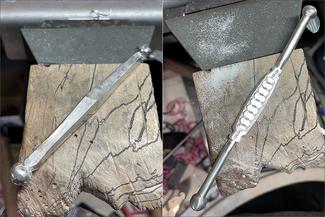Forging Jewelry from an Ingot
In this demo focused virtual class, attendees will learn how to transform an ingot of silver into a signet style ring and a bracelet using forging techniques commonly used in west Africa with just a hammer, an anvil, and files! Class will focus on learning to create and forge out lengths of wire, sphere elements, ring and bracelet shapes, as well as some decorative elements. The instructor will also review how to properly pour ingots, as well as how to transform hammers into more efficient tools. A minimal amount of soldering will be used to close the bottom of the ring shank.
Meet the instructor

Matthieu moved from Paris to New-Mexico when he was 19, where for seven years he studied Navajo, Hopi and Zuni jewelry techniques. He was immediately drawn to stamping, making concho belts and bracelets. He then moved to Mali, West-Africa and worked for a few years with the Fulani, Tuareg and Bambara jewelers.
In 1999, Matthieu settled in Montreal Canada and continued his studies by going to a jewelry school and learning a more classical part of the trade. Over the years, Matthieu has returned to Africa regularly.
In 2014, Tim McCreight and Mattheiu Cheminee created the Toolbox Initiative, a non-profit organization that helps jewelers in West Africa through the gifts of donated tools.
“I have been stamping and making stamps since the beginning and have developed a form of stamping design by creating patterns that fill the entire piece of metal. This is called “tessellation”.
Matthieu has written two books, “Legacy, jewelry techniques of West Africa“ and “The Art of Stamping”, both published at Brynmorgen Press.
Visit Matthieu's website or instagram page for more info on his work.
Materials & Tools
The following supplies will be used for course demonstrations and objectives. A suggested item and/or vendor has been provided below for reference. Click the vendor name (in red) to be redirected to a page where you can find the item. The quantities needed for each item are listed first. If ordering, please be aware that some items may come in larger quantities than needed for this class. We recommend not opening an item's packaging until the day of the workshop. Student participation during or in-between class sessions is strongly encouraged but not required - observers are welcome.
Metal/raw materials (.999 silver is highly recommended and much easier to work with, but sterling silver grain can also be used. You can instead use a 1/2" copper rod for practice if silver is not possible, in which case you will not need to pour an ingot.):
- 3ozt x .999 silver grain (Rio Grande)
Hand tools (you either need a forging hammer or a cross peen hammer):
- 1 x forging hammer (such as Rio Grande or The Hammer Source)
- 1 x cross peen hammer (such as Rio Grande or The Hammer Source)
- 1 x steel anvil (such as Harbor Freight or Harbor Freight or Vevor)
- 1 x flat hand file - cut #0 (Rio Grande)
- 1 x half round file - cut #0 or cut #2 (Rio Grande)
- 1 x steel ring mandrel (Amazon)
- 1 x bench pin - optional but you will be filing (Rio Grande)
- 1 x jewelers saw - optional (Rio Grande)
- 1 x pack #2/0 saw blades - optional (Rio Grande)
Torch setup (You will need a large enough torch to melt your ingot, but there is only one small seam to solder on the ring shank. A video will be sent to you for how to make an ingot mold using a charcoal block or a piece of hard wood, if you do not have a steel mold.):
- 1 x fireproof area - steel sheet, tile, etc. (Amazon or Home Depot)
- 1 x fire brick(s) (Rio Grande)
- 1 x torch - Silversmith or large MAP gas (Rio Grande or Home Depot)
- 1 x #1 torch tip - if getting Silversmith (Rio Grande)
- 1 x soldering tweezers - if soldering (Rio Grande)
- 1 x soldering pick - if soldering (Rio Grande)
- 1 x paste flux - if soldering (Rio Grande)
- 1 x copper tongs - for pickle (Rio Grande)
- 1 x brass brush (Rio Grande)
- silver solder - hard or medium - a very small piece (Rio Grande)
- pickle - for non-ferrous metals (Rio Grande)
- crock pot or tempered glass container with lid (Amazon)
- ingot mold - steel or charcoal block / hardwood to carve channel into
- quench bowl or sink - for quenching and rinsing
- small brush - for flux
Other/miscellaneous items:
- particulate dust mask
- eye protection
- shop rags/towels
- Sharpie marker(s)
- household drill and large drill bit - if making ingot mold
- ruler

